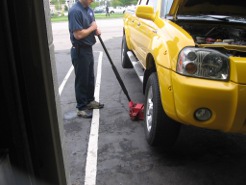If you are interested in getting the maximum life from your tires, whether you do the job yourself or have it done by an auto repair shop, rotating your tires regularly is very important. Rotating tires evens out the way the tires wear and when it is done properly can extend the life of your tires, as well as improve the way the car handles sudden stops and turns. 
The best indication that it’s time for rotating your tires is when you notice an uneven tread wear. When you look closely at your tires, is there more wear showing on the inside or outside of one tire more than another? Uneven tread wear is unavoidable since the weight of a car isn’t distributed evenly to all four corners. Most engines are in the front and because the engine is the heaviest thing in the car, the front tires carry more weight. This means that the front tires will wear quicker than the rear. This is the reason it’s necessary to rotate the tires, front-to -rear several times during the life of your tires, to equalize tread wear and maximize their life. This is what we mean when we recommend “rotating tires”. Tires will develop wear patterns as they age. Some of these patterns are caused by the suspension system and the alignment of each car, this is why the tires are kept on the same side of the car when they are rotated. By rotating the tires, moving each tire to a different corner of the car, then each tire wears more evenly and the life of the tires is extended. Other indications of a needed tire rotation are: noticing trouble handling your car when you are braking, or if your tire traction isn’t good in slippery or wet road conditions. These are all signs you should be aware of and not ignore.
The general rule for how often to rotate tires is every 3,000 to 7,000 miles, but your vehicle’s manufacturer manual will also have their recommended times. If you are in the habit of changing your oil every 3,000 miles, you can also pair the tire rotation with your oil changes and rotate the tires every other oil change. You can also maintain a log or spreadsheet to help you keep track of when you perform tire rotations, this will help you stay up to date and keep your car running smoothly. If you store the log in your glove compartment, you’ll have a handy reference with you.
For all of your Denver Auto Repair needs, trust Express Car Car. Call (303) 691-2760 or stop by our shop today.
